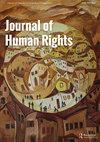Belgium’s “Truth Commission” on its overseas colonial legacy: An expressivist analysis of transitional justice in consolidated democracies
IF 1.6
2区 社会学
Q3 INTERNATIONAL RELATIONS
引用次数: 0
Abstract
Abstract In the summer of 2020, the Belgian Parliament established a Special Parliamentary Commission tasked with launching an enquiry into Belgium’s overseas colonial legacy and reflecting on appropriate reparations. It was the first consolidated democracy to establish a truth commission to investigate the historical and ongoing injustices related to overseas colonialism. In this article, I argue in favor of treating this commission as a truth commission and focus on the extra-legal and expressivist functions of truth commissions to understand potential long-term and indirect effects of this initiative. The central premise is that justice processes can shape and create meaning systems that gain the status of “truth” and can come to dominate how we understand and organize ourselves and our social world. In the descriptive section, I use primary sources to examine the genesis, mandate, composition, first steps, and reception of the commission’s work, foregrounding critical voices. In the analytical section, I examine whether the commission is indeed furthering a thick kind of accountability or whether, instead, it risks cementing and contributing to epistemic injustices. As such, the article provides a detailed overview of a commission that has been scantly covered in academic literature, as well as contributing to the debate about potentially unforeseen effects of using transitional justice processes such as truth commissions in consolidated democracies.比利时关于其海外殖民遗产的“真相委员会”:对巩固民主国家过渡正义的表现主义分析
摘要2020年夏天,比利时议会成立了一个特别议会委员会,负责调查比利时的海外殖民遗产,并反思适当的赔偿。它是第一个建立真相委员会来调查与海外殖民主义有关的历史和持续的不公正现象的巩固民主国家。在这篇文章中,我主张将该委员会视为真相委员会,并关注真相委员会的法外和表达功能,以了解这一举措的潜在长期和间接影响。核心前提是,正义过程可以塑造和创造意义系统,从而获得“真理”的地位,并可以支配我们如何理解和组织自己和我们的社会世界。在描述部分,我使用主要来源来研究委员会工作的起源、任务、组成、第一步和接受情况,突出批评声音。在分析部分,我考察了委员会是否真的在推进一种严格的问责制,或者相反,它是否有巩固和助长认识上的不公正的风险。因此,这篇文章详细概述了学术文献中很少涉及的一个委员会,并为关于在巩固民主国家中使用过渡司法程序(如真相委员会)可能产生的不可预见的影响的辩论做出了贡献。
本文章由计算机程序翻译,如有差异,请以英文原文为准。
求助全文
约1分钟内获得全文
求助全文

 求助内容:
求助内容: 应助结果提醒方式:
应助结果提醒方式:


